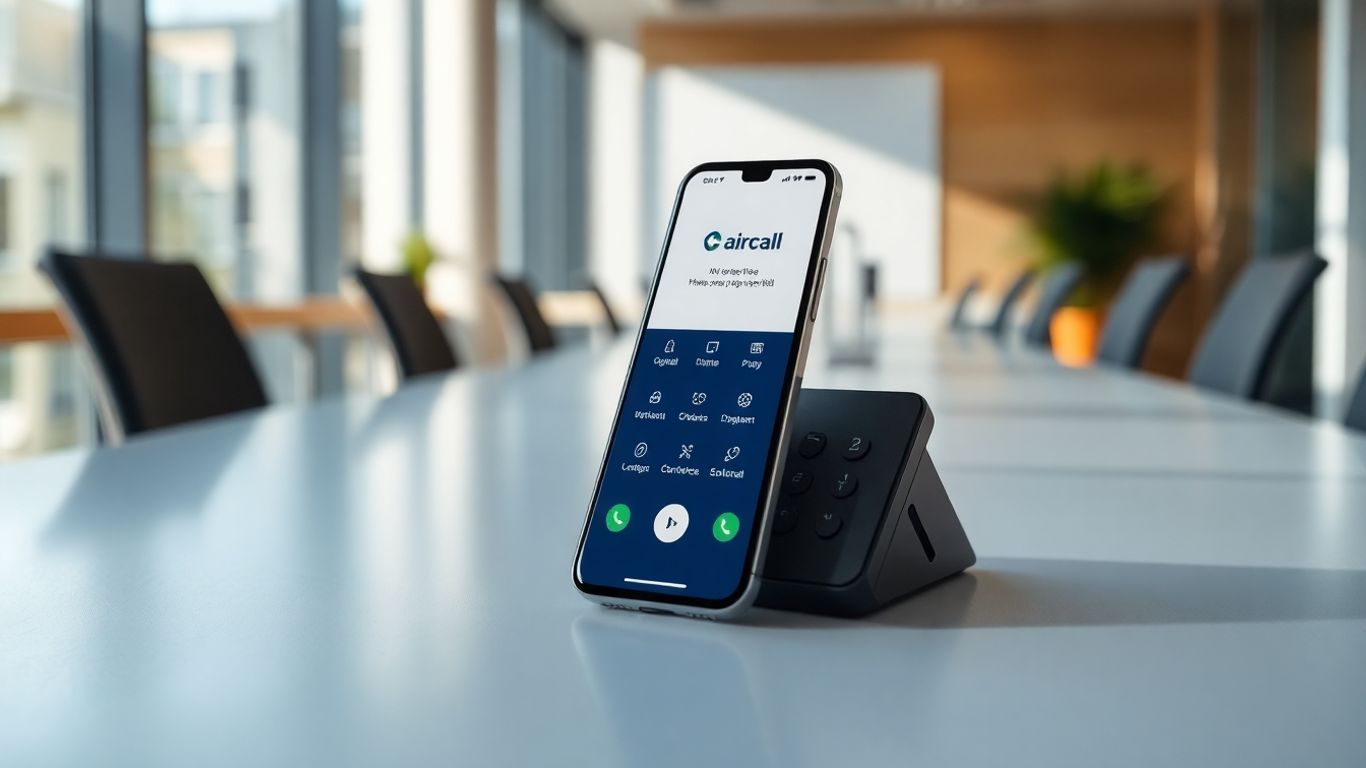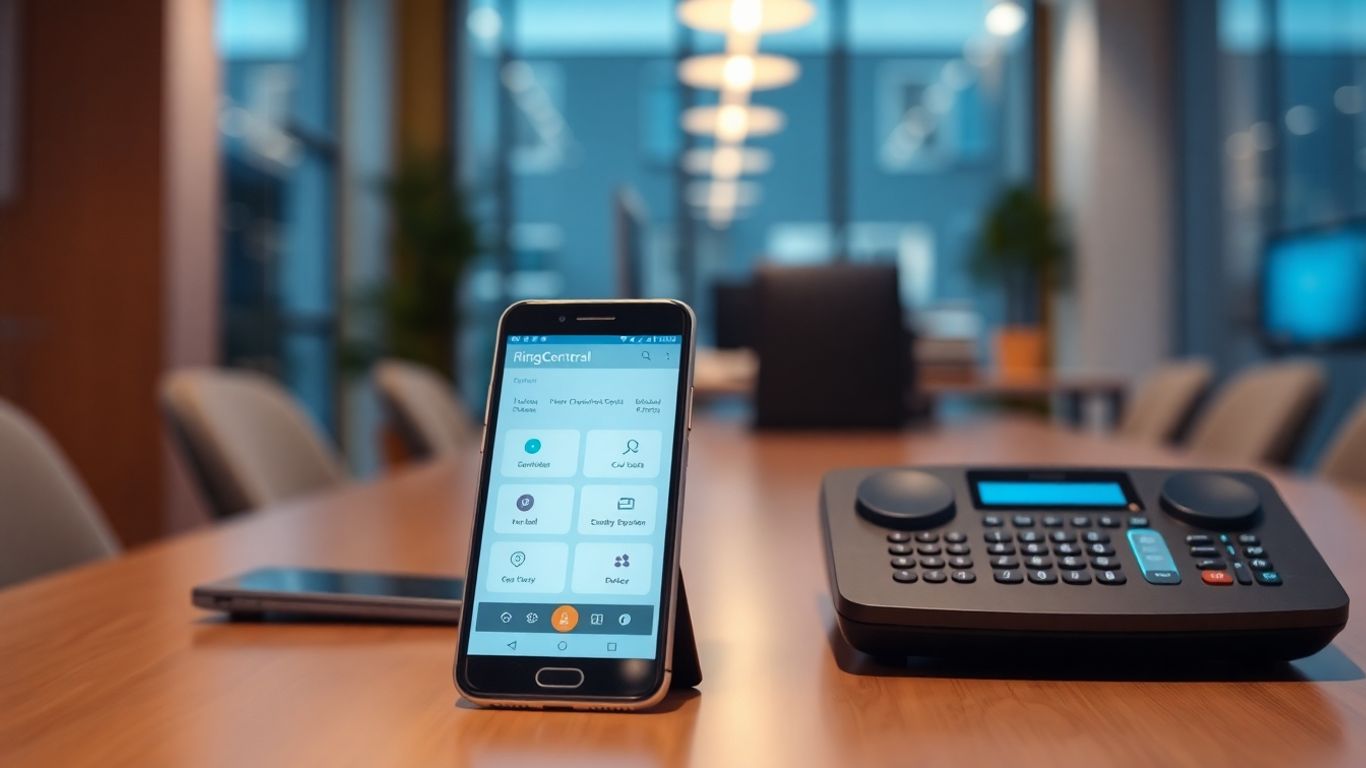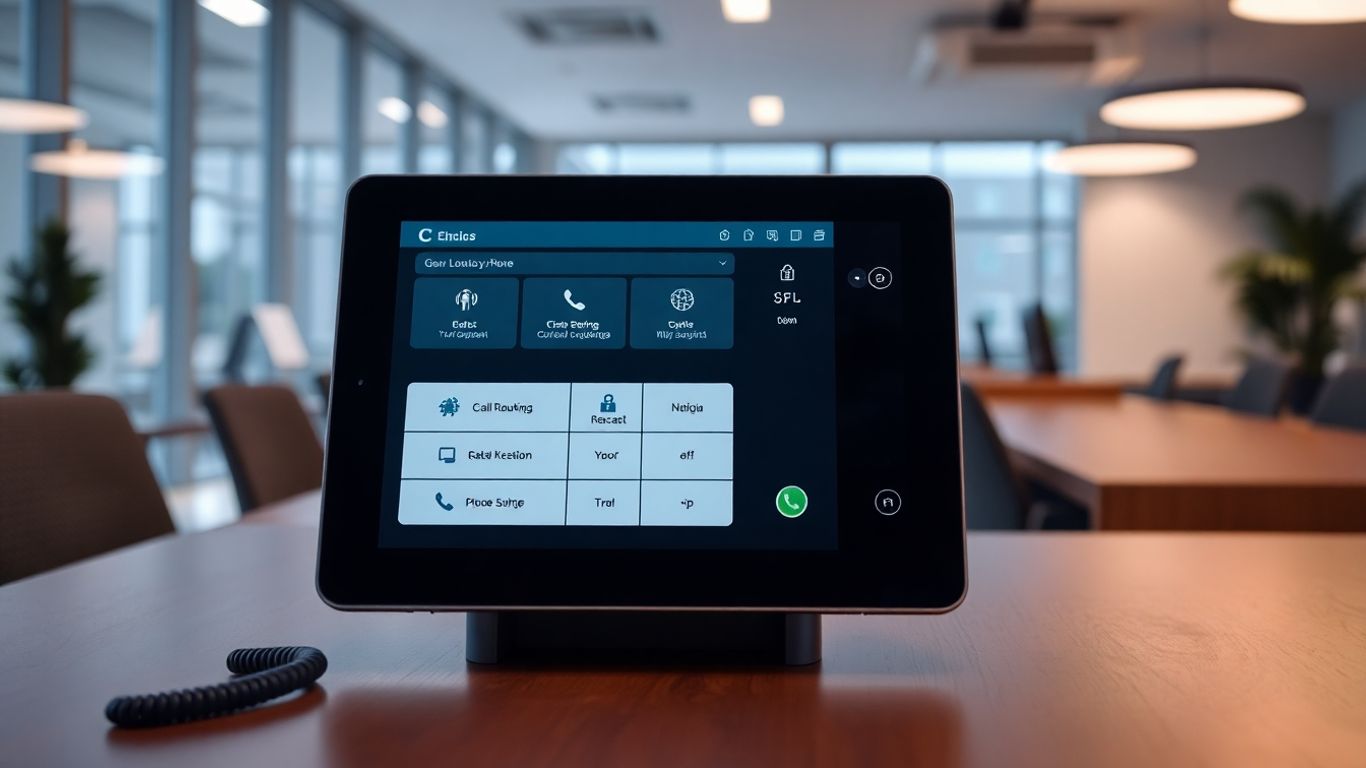In today's fast-paced business world, keeping up with every call can feel like a juggling act. You want your customers to get the help they need, right when they need it, but your team is already swamped. That's where phone systems with auto attendant come in. These systems act like a virtual receptionist, handling the initial calls so your staff can focus on what they do best. We're looking at some of the top options for 2025 that can make your business run a whole lot smoother.
So, let's talk about My AI Front Desk. This isn't your grandma's answering machine, folks. We're looking at a full-blown AI receptionist that's designed to handle your customer interactions 24/7. Think of it as hiring a super-efficient employee who never sleeps, never takes a break, and can answer company-specific questions, schedule appointments, and even respond via text or phone, all while sounding remarkably human.
This system aims to be the first point of contact for your inbound calls, acting as a virtual receptionist that automates scheduling and answers frequently asked questions. It's built to reference information you provide, so it knows your business inside and out. Setting it up is supposed to be pretty quick, usually under five minutes, which is a nice change of pace from some tech setups.
Here's a quick rundown of what it can do:
The real magic here is how it integrates with other tools. With Zapier integration, it can connect to thousands of apps, creating a two-way data flow. This means when a call ends, your CRM can update automatically, or if the AI spots a need for a follow-up, a task can be created without anyone lifting a finger. It's about making your business operations run smoother by connecting the dots between your communication and your other business systems.
They also offer features like AI-powered voicemail transcription, so you can quickly read messages instead of listening to them, and unlimited parallel calls, meaning your system won't get bogged down even during peak times. It's designed to be fast, responding in milliseconds, which helps keep conversations natural and avoids that frustrating robotic feel.
3CX is a pretty solid option if you're looking for a phone system that can handle your auto attendant needs. It's basically software that you can install either on your own servers or run in the cloud, giving you a lot of flexibility. What's cool about 3CX is that it's not just for big companies; it can work for businesses of all sizes. They've packed it with features to make communication smoother and, hopefully, make your customers happier.
One of the standout things about 3CX is how adaptable it is. You can set it up however works best for your business. Plus, it plays nice with a bunch of other tools you might already be using, like your CRM. This means calls can be routed more intelligently, and you can get more information about who's calling.
Here are some of the things 3CX brings to the table for auto attendants:
Setting up an auto attendant with 3CX can really change how callers experience your business. It's about making sure they get to the right person or department quickly, which makes your company look more professional and organized. Plus, it frees up your staff from having to answer every single call, letting them focus on more important tasks.
If you're looking for a system that can grow with you and connect with your other business software, 3CX is definitely worth a look for its auto attendant capabilities.

Aircall is a pretty solid choice if you're running a small to medium-sized business and need to get a handle on your calls without a huge headache. It’s built to help you manage calls better and grow without everything falling apart. They’ve got some neat features like an AI Voice Agent that can handle some of the basic stuff, smart call routing so calls go to the right person, and they record calls which is super handy for training or just remembering what was said.
What I really like is how easy it is to see what’s going on. The dashboard gives you a real-time look at how your team is doing, and it connects with over 200 other tools you probably already use, like Salesforce or Zendesk. This means less jumping between different apps, which is always a win.
Here’s a quick rundown of what Aircall brings to the table:
Aircall really shines when it comes to making customer communication feel more organized and less chaotic. It’s designed to be user-friendly, so you don't need to be a tech wizard to get it set up and running. Plus, their customer support seems to get good marks, which is always a relief when you're dealing with new software.
While it might cost a bit more than some of the super basic options out there, the features you get, especially the AI capabilities and the sheer number of integrations, make it a strong contender for businesses looking to step up their communication game. It’s definitely worth checking out if you want to streamline how you handle sales and support calls. You can even try it out for free to see if it fits your needs. It’s a good way to get a feel for how it can help your business communicate more effectively.

RingCentral is a pretty robust platform that aims to be an all-in-one solution for business communications. It's got a lot of features packed in, which can be great if you need a lot, but might be a bit much if you're just starting out or have simpler needs.
One of the standout things about RingCentral is how many other apps it can connect with. We're talking over 500 integrations, including all the big names in CRM and team collaboration. This makes it a solid choice if your business uses a bunch of different software and you want them all to talk to each other. They even have API support if you need to build something custom.
RingCentral's new AI Receptionist (AIR) is a big deal, designed to handle customer calls automatically. It can answer questions, route calls, and even book appointments, which could really cut down on how many people you need on your support team. It's built right into their phone system, so it feels pretty integrated.
Here's a quick look at what you get:
Now, it's not all sunshine and rainbows. RingCentral Advanced can get pretty pricey, especially compared to some other options out there. If you don't need all those fancy integrations and advanced features, you might find yourself paying for stuff you don't use. For example, their cheapest plan has fewer toll-free minutes than some competitors, and you don't get CRM integrations on that basic tier.
While RingCentral offers a wide array of features and integrations, its complexity and higher price point might make it less suitable for smaller businesses or those with straightforward communication needs. It truly shines for medium to large businesses that can take full advantage of its extensive capabilities.
If you're looking for a system that can grow with your business and handle complex communication workflows, RingCentral is definitely worth a look. Just be prepared for the cost and the learning curve that comes with such a feature-rich platform. You can explore their AI chatbot capabilities to see how advanced automation can work for your business.
Grasshopper is a virtual phone system that really focuses on small businesses and entrepreneurs. It’s pretty straightforward, which is nice when you’re trying to run a business and don’t have time to mess with complicated tech. The auto-attendant feature here is designed to make your small operation sound bigger and more professional, which is a big plus.
It’s super easy to get set up, and that’s a huge selling point for folks who just need a reliable phone system without a steep learning curve. You get the basics covered, like custom greetings so callers know they’ve reached the right place, and call forwarding to make sure calls actually get to the right person.
Here’s a quick look at what Grasshopper brings to the table:
Grasshopper is a solid choice if you're a solo entrepreneur or a small team that needs a professional phone presence without a lot of bells and whistles. It’s built for simplicity and getting the job done.
While it’s great for US and Canadian businesses, it’s worth noting that Grasshopper doesn’t really offer direct integrations with other business tools like CRMs. This might be a dealbreaker if you’re looking for a system that plays nicely with your existing software stack. But if you prioritize ease of use and a professional image above all else, Grasshopper is definitely worth a look.
Dialpad is a pretty interesting player in the business phone system game, especially if you're looking for something that goes beyond just basic call handling. What really sets them apart is their focus on AI. Their Voice Intelligence (Vi) technology is designed to actually make sense of your calls, not just record them.
Think about it: instead of just having a bunch of call recordings to sift through, Dialpad can transcribe them for you. Even better, it can pull out key action items and give you real-time insights during conversations. This is super handy for sales teams who need to track follow-ups or customer support folks who need to quickly identify issues.
Here's a quick look at what you get:
They also offer standard auto-attendant features, call routing, and international calling, which are pretty much table stakes these days. The integration ecosystem is a big plus, helping to keep your other business tools connected. However, some users have mentioned that call quality can sometimes be a bit spotty, and the interface might take a little getting used to if you're new to this kind of system.
Dialpad really leans into the AI aspect, aiming to make your phone system smarter and more proactive. It's not just about making and receiving calls; it's about getting actual value and actionable information from those interactions. This can be a game-changer for businesses that handle a lot of calls and need to stay on top of every detail.
CloudTalk is a solid choice if you're looking for a phone system that offers good call center features without being overly complicated. It comes with the basics you'd expect, like an auto-attendant, call forwarding, and call queuing, which are pretty standard these days but still important to have.
One of the standout features is its real-time dashboard. This thing lets you keep an eye on important metrics like how many calls are being dropped, how long people are waiting, and how long calls are actually lasting. It’s helpful for getting a quick snapshot of what’s going on with your customer service.
CloudTalk also has a mobile app, so you can take calls on the go, which is a lifesaver if you’re not always at your desk. They also boast a decent number of integrations, around 36, including popular ones like HubSpot, Salesforce, and Zendesk. This means it can play nice with other tools you might already be using.
However, it's not all perfect. Some users have mentioned that connection reliability can sometimes be an issue, and the customization options aren't as extensive as some other platforms out there. So, while it’s good at what it does, you might find it a bit limiting if you need to tweak things extensively.
Here's a quick look at what they offer:
While CloudTalk provides a good set of features for managing calls and customer interactions, it's worth noting that some users have reported occasional connection hiccups and a less flexible approach to customization compared to some competitors. It's a reliable option, but perhaps not the most adaptable if you have very specific needs.

8x8 offers a pretty solid cloud-based communication platform, and their auto attendant feature is definitely a big part of that. It's designed to handle incoming calls smoothly, routing them to the right place without you having to lift a finger. This system is known for being reliable and secure, which is always a plus when you're dealing with business calls. They've also got a good global reach, so if your business operates internationally, 8x8 could be a good fit.
One of the standout features for larger teams is their advanced call management. Think things like call monitoring, where a supervisor can listen in without the caller knowing, or even whispering advice to an agent during a live call. This is super helpful for training and quality control. Plus, their international calling allowances are pretty generous, often better than what some competitors offer on their base plans.
Here's a quick look at what you can expect:
While 8x8 has a lot going for it, especially for bigger teams, it's worth noting that their pricing isn't always out in the open. This can make budgeting a bit tricky if you prefer clear, upfront costs. Some businesses might find other options more straightforward when it comes to understanding the exact price for their needs.
They also recently rolled out some updates to their desktop and web apps, like a chat summarization feature that can save you time catching up on conversations. They've also improved group MMS messaging and made the platform more accessible for users who rely on screen readers. If you're looking for a robust system that can grow with your business and offers strong collaboration tools, 8x8 is definitely worth checking out. You can find more details on their business phone system capabilities.

RingOffice is a solid contender in the business phone system arena, especially if you're looking for a robust auto attendant feature. It's built to handle calls smoothly, even when things get hectic. Think of it as a digital receptionist that's always on, ready to direct your customers without missing a beat.
One of the standout things about RingOffice is how well it plays with other software. They boast integrations with over 500 applications, which is pretty impressive. This means you can connect it to your CRM, your helpdesk, or whatever else your team uses daily. They even offer API support if you need to build something custom. This flexibility is a big deal, especially for businesses with unique workflows or specific software needs.
Here's a quick look at what makes RingOffice tick:
While RingOffice offers a lot of power, especially with its integration capabilities and call management tools, it's worth noting that this level of sophistication can come with a higher price tag. Businesses with simpler needs or tighter budgets might find other options more budget-friendly, but for those who need deep integration and advanced call handling, RingOffice is definitely worth a look.
They also have some neat features for training your staff, like the ability to listen in on calls, whisper advice to your agents without the caller hearing, or even barge into a call if needed. This is super handy for call centers or teams that are constantly bringing on new people. It’s not something you see in every phone system package, so it’s a nice bonus.
So, you've got your phone system, and it's doing a pretty good job. But what if it could do more? That's where Zapier comes in. Think of Zapier as the ultimate connector for all your apps. It lets your phone system talk to, well, pretty much anything else you use for your business – your CRM, your email, your project management tools, you name it.
This isn't just about linking apps; it's about making your whole operation run smoother. When your phone system and other tools are connected, information flows automatically. For example, a call ends, and bam, a new contact is added to your CRM. Or a customer leaves a voicemail, and a text alert pops up on your project board. It cuts down on manual data entry, which, let's be honest, is nobody's favorite task.
Here's a quick look at what this kind of integration can do for you:
Basically, integrating your phone system with Zapier turns it from just a communication tool into a central hub that drives other business processes. It's about making your technology work for you, not the other way around. It's a pretty big deal if you're looking to save time and reduce errors.
Did you know that our service works great with Zapier? This powerful tool helps connect different apps so they can share information automatically. Imagine your customer interactions flowing smoothly between your favorite programs! Want to see how easy it is to set up? Visit our website to learn more and get started today.
So, there you have it. Picking the right phone system with an auto attendant isn't just about getting a fancy new gadget for your office. It's about making your business run smoother, making your customers happier, and honestly, making your own life a little less chaotic. We looked at some solid options out there for 2025, each with its own strengths. Whether you're a small startup or a growing company, there's definitely a system that can help you handle calls like a pro, without needing a whole team of receptionists. Take some time, check out what fits your budget and your needs, and get ready to see how much of a difference a good auto attendant can make.
Think of an auto attendant as a super-helpful virtual receptionist for your business. When someone calls, it answers the phone automatically and then gives options, like 'Press 1 for sales' or 'Press 2 for support.' This helps callers get to the right place without anyone having to manually transfer calls, making things faster and smoother for everyone.
An auto attendant can really boost your business by making sure customers always get a quick and professional response, even if your team is busy. It helps you avoid missing important calls or sales opportunities. Plus, it frees up your staff to focus on other important tasks, making your whole team more productive.
Not at all! Most modern auto attendant systems are designed to be really easy to set up. You can usually get one running in just a few minutes. You'll typically just need to record a greeting and decide on the menu options for callers. It's much simpler than you might think!
Absolutely! That's one of the best parts. You can set up your auto attendant to work 24/7. This means you can have it answer calls, take messages, or direct callers to after-hours information even when your office is closed. It's like having a receptionist who never sleeps.
An auto attendant is like a basic menu ('Press 1 for X'). An IVR (Interactive Voice Response) system is a bit smarter. It can understand what you say or ask more complex questions, like checking an order status. Some systems combine both, giving you simple menus and more advanced options.
Yes, many auto attendant systems can connect with other tools you use, like your customer relationship management (CRM) software. This means when a call comes in, the system can automatically pull up customer information or update records after a call ends, making your workflow much smoother.
If the auto attendant can't handle a specific question or need, it's designed to smoothly transfer the caller to a live person on your team. It can also offer to take a message or direct the caller to a specific department or resource that can help, ensuring the caller's needs are met.
Many of the newer auto attendant systems use Artificial Intelligence (AI). This means they can understand more natural language, answer complex questions about your business, schedule appointments, and even respond via text message, acting much more like a human assistant.
Start your free trial for My AI Front Desk today, it takes minutes to setup!








